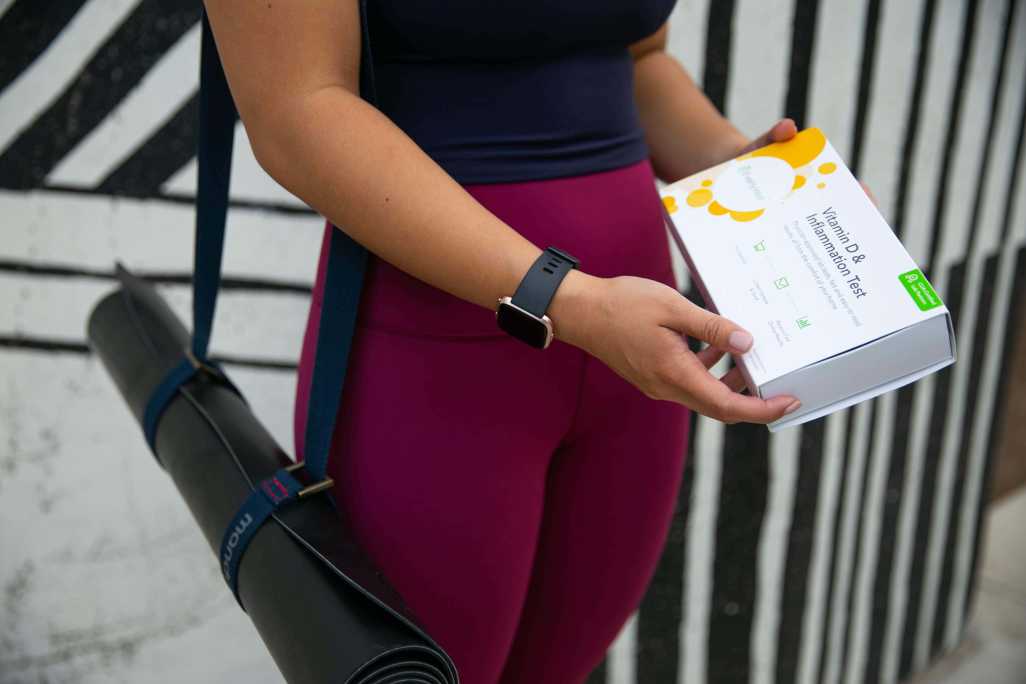
What Inflammation and Vitamin D Levels Can Reveal About Your Heart Health
February is Heart Health Month! Heart disease is the #1 cause of death in the United States – so if you ever needed an excuse to be proactive about your heart health, now’s the perfect time to consider a heart health test.
Over the next weeks of February, you’ll get a closer look at several at-home lab tests that can give you a better picture of your heart health. This week, we’re putting a spotlight on the Vitamin D and Inflammation Test.
Inflammation is one of two key factors in the development of coronary artery disease (or coronary heart disease) – a dangerous but common form of heart disease. (Cholesterol is the other key factor.)
As such, your body’s inflammation levels – measured with a substance in your blood called C-reactive protein (CRP) – can help you discover more about your heart disease risk. There is a test that detects even low levels of CRP, called high-sensitivity CRP – or hs-CRP. An easy, quick way to check your inflammation levels is the Everlywell Vitamin D and Inflammation Test kit. You can take this test at home – no need to set up an appointment with your doctor and go to a lab.
This kit also lets you test your vitamin D levels. Research suggests that vitamin D can affect inflammation – and potentially your heart disease risk. So, with the Vitamin D and Inflammation Test, you can check 2 markers that impact heart health – and uncover serious threats to your heart that a cholesterol test would miss. (Cholesterol tests can’t detect how much inflammation is in your body.)
Keep reading to discover more about these 2 markers – beginning with high-sensitivity C-reactive protein.
What is High-Sensitivity C-Reactive Protein (hs-CRP)?
If you have a high level of long-term – or chronic – inflammation, you’re at a greater risk of coronary heart disease. High-sensitivity C-reactive protein – or hs-CRP – is one way of measuring the amount of inflammation in your body.
C-reactive protein is a substance your liver makes when there’s inflammation in your body. If there’s a lot of inflammation going on, your liver will churn out a high amount of CRP – increasing the level of hs-CRP in your bloodstream.
A single test of hs-CRP is not enough to detect chronic inflammation. For example, your CRP levels might temporarily jump up if you have an infection like the flu [1] – which is simply because short-term inflammation is a common immune system response to infection and injuries.
However, if your hs-CRP levels are consistently elevated (as revealed by repeated testing), then this is a sign of chronic inflammation. If you have an elevated hs-CRP then you should do another test in approximately 2 weeks and the lower of the two values is considered to be your “baseline.”
You might experience fatigue, ongoing joint pain, high blood pressure, or other symptoms if you have chronic inflammation.
How hs-CRP Levels Affect Heart Disease Risk
The higher your hs-CRP level, the greater your risk of heart disease (assuming your hs-CRP levels are chronically high). You’re especially at a high risk of heart disease if your hs-CRP level is 3 milligrams per liter (mg/L) or more [2]. An hs-CRP level that sits between 1 and 3 mg/L indicates a moderate risk of heart disease. Individuals with hs-CRP levels below 1 mg/L are generally at the lowest risk.
Checking your hs-CRP levels can be an especially useful way to protect your well-being since cholesterol screening is not a foolproof way to gauge your heart disease risk. This is because heart disease can still occur even if your cholesterol levels aren’t alarmingly high.
Close to half of people who suffer from a heart attack have normal or only slightly-above-normal cholesterol levels, according to some estimates [3]. Checking hs-CRP levels can thus alert you to heart disease risk even if a cholesterol checkup fails to do so.
Family History and hs-CRP
Is there a link between a family history of heart disease and CRP levels? Some scientific research suggests that there is: a 2009 study found that a parental history of heart disease means a greater chance of high CRP levels [4]. Another study showed that elevated CRP levels are more likely if a parent or sibling has suffered from a heart attack [5].
So if heart disease has appeared in your family, consider making it a priority to check your CRP levels.
Foods That Can Help You Maintain Normal hs-CRP Levels
The following foods are considered part of a heart healthy diet:
- Fatty fish like salmon and tuna, as they are a rich source of omega-3 – a nutrient that has anti-inflammatory effects (note that experts recommend eating fatty fish at least twice a week [6])
- Leafy vegetables like spinach and kale
- Various fruits like strawberries, blueberries, and oranges
- Tomatoes
- Olive oil
- Nuts
Vitamin D and Heart Health
Vitamin D – which your body makes when sunlight strikes your skin – helps your gut absorb calcium. Vitamin D thus contributes to skeletal health (since your body uses calcium to make strong bones) – but that’s not all there is to the “sunshine vitamin.”
Increasingly, scientific evidence suggests vitamin D can help keep inflammation in check [7] – and that low levels of vitamin D are associated with a higher amount of inflammation.
So, since vitamin D deficiency is linked with inflammation – which is heavily involved in heart disease – is there a connection between vitamin D levels and heart disease risk?
Vitamin D Deficiency and Heart Disease Risk
Low levels of vitamin D may indicate a higher risk of heart disease – including heart failure and coronary heart disease [8]. In a 2008 study, individuals with severe vitamin D deficiency had an 80% greater 5-year risk of experiencing a coronary event compared to those who had better vitamin D levels [9].
How to Make Sure You’re Not Vitamin D Deficient
Vitamin D deficiency – which affects about 40% of adults in the United States – potentially puts your heart in harm’s way. So how can you make sure your vitamin D levels aren’t too low?
First, you can easily discover where your vitamin D levels currently are with an at-home Vitamin D and Inflammation Test. (If testing shows you aren’t getting enough vitamin D, you may want to discuss this with your doctor.)
Second, try spending more time outdoors to soak in the sun’s rays – and eat foods fortified with vitamin D (like milk and cereal).
 Eat foods fortified with vitamin D (like milk and cereal) to boost your vitamin D levels.
Eat foods fortified with vitamin D (like milk and cereal) to boost your vitamin D levels.
Note that the recommended daily amount (RDA) of vitamin D from dietary sources is 600 International Units (IU) if you’re less than 70 years old – and 800 IU if you’re over 70.
How You Can Check Your Inflammation and Vitamin D Levels at Home
Knowing your inflammation and vitamin D status can give you more insight into your heart health. You can check both your inflammation and vitamin D levels from the comfort of home with a single kit: the Everlywell Vitamin D and Inflammation Test.
It’s a quick-and-easy test to take: simply collect a tiny sample of blood and mail it to the lab for analysis (a prepaid shipping label comes with the kit). You can then view your results on EverlyWell’s secure online platform.
In short, the Vitamin D and Inflammation Test is a convenient but powerful way to be proactive about your heart health. Or, in the words of one test-taker: “This was a simple, fast method to discover vital health information without involving insurance or a trip to the clinic.”